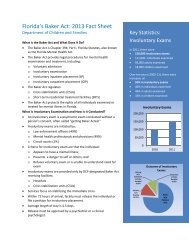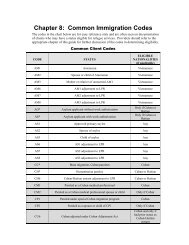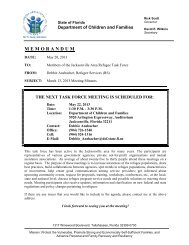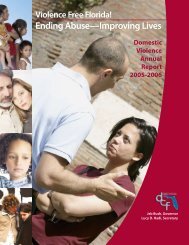The National Strategy for Child Exploitation Prevention and Interdiction
The National Strategy for Child Exploitation Prevention and Interdiction
The National Strategy for Child Exploitation Prevention and Interdiction
You also want an ePaper? Increase the reach of your titles
YUMPU automatically turns print PDFs into web optimized ePapers that Google loves.
solutions. An effective prevention program <strong>for</strong> youth emphasized the need to target an array of settings, including schools, homes, <strong>and</strong> communities. Consistent with these ecological models, four populations that need to be targeted <strong>for</strong> a comprehensive approach to CSA prevention are: children/youth, parents, professionals, <strong>and</strong> the public. For each target, suggestions <strong>for</strong> primary prevention ef<strong>for</strong>ts are offered, <strong>and</strong> opportunities <strong>and</strong> challenges are described. Although tertiary prevention ef<strong>for</strong>ts, such as treating offenders <strong>and</strong> victims, are crucial <strong>for</strong> eradicating the problem, one section describes population-focused interventions that occur with essentially well people with the aim of reducing the number of new incidences in the population. Results suggest that currently not enough is being done to prevent the sexual exploitation of children. Changing Contexts of Deference to Elders, <strong>Child</strong>ren's Rights <strong>and</strong> Sexual <strong>Exploitation</strong> of <strong>Child</strong>ren in TanzaniaBali, <strong>The</strong>odora Axweso Luxuma. Dissertation Abstracts International, A: <strong>The</strong> Humanities <strong>and</strong> Social Sciences, vol. 69, no. 10, pp. 4013, 2009. Abstract: Regardless of the centrality of political <strong>and</strong> economic resources in the constructions of power, this research argues that the notions of power are contested. Exploration of the relationship between deference to elders <strong>and</strong> the vulnerability to childhood sexual exploitation with 105 young women has shown that certain actions like sexual intercourse may transmit symbolic power. Ironically, the growing poverty <strong>and</strong> increasing inaccessibility to income earning opportunities that affect Tanzanian men <strong>and</strong> women equally also provide alternative routes <strong>for</strong> women to create their new roles. Unlike in traditional communities where elders monopolized hegemonic power due to their control of ancestral rituals <strong>and</strong> clan resources, today women can turn to <strong>for</strong>mal education, technology <strong>and</strong> the media <strong>for</strong> examples of alternative survival routes including unconventional ones like survival sex. This research employed in<strong>for</strong>mal <strong>and</strong> structured interviews to test the hypothesis that continued deference to elders within the changing context of increased urbanization, nuclear family system <strong>and</strong> paid childrearing, increases children's vulnerability to sexual exploitation. Elder interaction, underst<strong>and</strong>ing of child sexual exploitation, access to support network, perception of self-esteem, importance of filial respect, rural/urban background, education levels <strong>and</strong> family types, were among the examined childhood experiences. <strong>The</strong> data were analyzed <strong>for</strong> emergent themes of underst<strong>and</strong>ing <strong>and</strong> prevalence of child sexual exploitation, power <strong>and</strong> control, <strong>and</strong> sexual exploitation vulnerability. <strong>The</strong> results supported the hypothesis by showing that conditions of deprivation increase children's vulnerable to sexual exploitation <strong>and</strong> the model explains 39.6% of the shared variance. <strong>The</strong> contribution of this research is twofold: taking the primary step to explore the role of childrearing contexts in predicting vulnerability to sexual exploitation <strong>and</strong> ascertaining that Tanzanian children are vulnerable to sexual predation regardless of where they grow up. This is because the cultural practices that subordinate women <strong>and</strong> children have remained strong in both rural <strong>and</strong> urban areas. This dissertation is presented in seven chapters: introduction, review of relevant literature, social <strong>and</strong> cultural background of Tanzania, methods <strong>and</strong> goals, analysis <strong>and</strong> results, discussion, <strong>and</strong> conclusion. “Little Italian Slaves”: Lessons Learned from the Padrone Boys. Jalongo, Mary. Early <strong>Child</strong>hood Education Journal, Dec2008, Vol. 36 Issue 3, p209-212, 4p. F-46
















